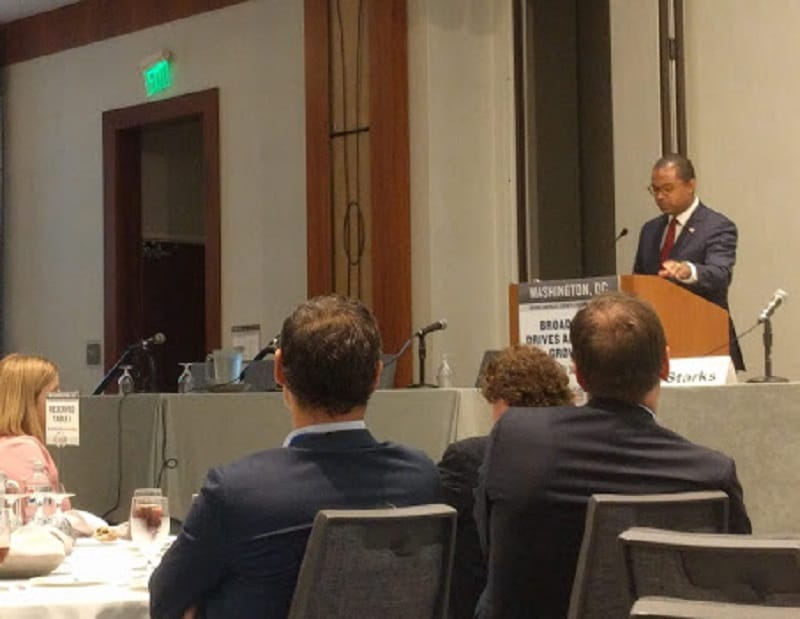FCC Commissioner Starks Touts High-Speed Internet as the ‘Great Equalizer’ at Broadband Communities Event
ALEXANDRIA, Virginia, November 1, 2019 – High-speed broadband has the potential to be the “great equalizer,” said Federal Communications Commissioner Geoffrey Starks at a regional Broadband Communities event Thursday. However, more work needs to be done in connecting and empowering underserved commu

ALEXANDRIA, Virginia, November 1, 2019 – High-speed broadband has the potential to be the “great equalizer,” said Federal Communications Commissioner Geoffrey Starks at a regional Broadband Communities event Thursday. However, more work needs to be done in connecting and empowering underserved communities, he said.
In his keynote address, Starks emphasized how robust data and sound public policy are interconnected in the goal to reduce internet inequality.
Fundamental programs, he said, such as the Universal Service Fund’s Lifeline Program and the Connect America Fund, should remain intact. Their data, however, should be analyzed to determine which communities still need a basic internet connection.
At the very least, Starks said, every individual who qualifies must enroll onto the programs and obtain access to voice and broadband services. Moreover, lack of connectivity isn’t exclusively a rural problem, as urban areas are also affected.
Despite always lacking the high-capacity broadband that they need, libraries are becoming the “tech-hub” of the 21st century, Starks said. As there are many Americans who cannot afford a computer, library resources help bolster digital literacy and affordability.
Other speakers in the conference’s Thursday afternoon session included Benton Institute for Broadband and Society Senior Fellow Jon Sallet and Google Chief Internet Evangelist Vinton Cerf. They discussed the trajectory of current broadband development with the FCC policy framework.
If the government is going to spend money on capital investment, Sallet said, then it has to be spent on networks that have the potential to expand. This way, the FCC ensures that future connectivity demands are met for at least a decade and that it receives proper social returns.
Sallet also discouraged the government’s use of the term “overbuilding,” arguing that it is not an accurate word to describe broadband competition.
When people describe “overbuilding,” he said, they simply mean that an area has multiple broadband networks available. The more competition there is, the more incentives incumbent providers must improve their services and give consumers more choices.
It’s possible for the broadband industry to have a natural monopoly, said Cerf. Private companies want to compete with other providers, not with the government. That’s why reverse spectrum auctions aren’t necessarily one-sided. The FCC as well as private companies should be going out of their way to make as much spectrum available as possible.
Regarding the trade-off of spectrum, Sallet said that it’s uncertain how providers are planning to distribute it. Building small cell sites, for instance, is different between rural and urban areas, as they must be built closely together to perform effectively.
Moreover, Sallet added, wireless carriers are only required to report areas where they can build networks, rather than where they are actually located.
The FCC’s current definition of high-speed broadband is 25 Megabits per second (Mbps) download /3 Mbps upload, he said. Yet some aspects of agency policy continue to require “broadband” at 10 Mbps down/1 Mbps up, even though that is not technically “broadband.”
Sallet emphasized the need for private providers and municipal governments to allocate responsibility in closing the digital divide.








